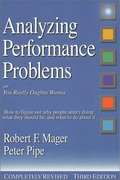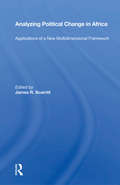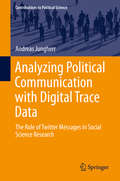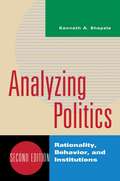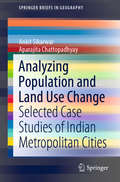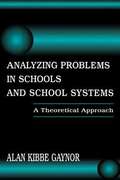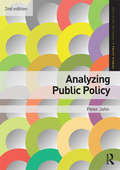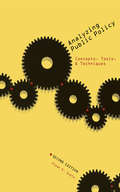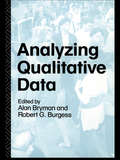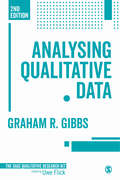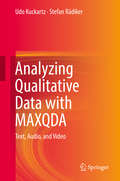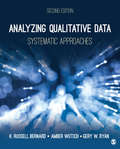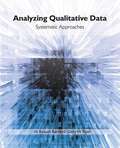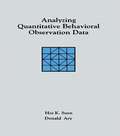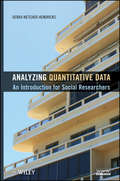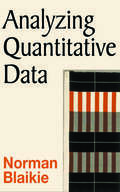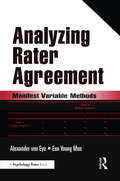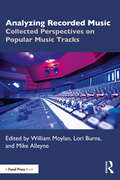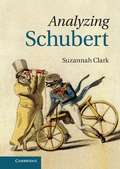- Table View
- List View
Analyzing Performance Problems: or You Really Oughta Wanna
by Robert F. Mager; Peter PipeIdentify the true causes of performance problems; Determine if you can use fast fixes; Identify realistic, economically feasible solutions.
Analyzing Pol Change/h
by James R ScarrittThis book addresses political instability and the role of the military in unstable politics, as well as to class formation, class conflict, and prolonged economic dependency in Africa. It uses a comprehensive theoretical approach based on systems-functionalist theories in solving these issues.
Analyzing Political Communication with Digital Trace Data: The Role of Twitter Messages in Social Science Research (Contributions to Political Science)
by Andreas JungherrThis book offers a framework for the analysis of political communication in election campaigns based on digital trace data that documents political behavior, interests and opinions. The author investigates the data-generating processes leading users to interact with digital services in politically relevant contexts. These interactions produce digital traces, which in turn can be analyzed to draw inferences on political events or the phenomena that give rise to them. Various factors mediate the image of political reality emerging from digital trace data, such as the users of digital services' political interests, attitudes or attention to politics. In order to arrive at valid inferences about the political reality on the basis of digital trace data, these mediating factors have to be accounted for. The author presents this interpretative framework in a detailed analysis of Twitter messages referring to politics in the context of the 2009 federal elections in Germany. This book will appeal to scholars interested in the field of political communication, as well as practitioners active in the political arena.
Analyzing Politics: Rationality, Behavior, And Instititutions (Second Edition)
by Kenneth A. Shepsle Mark S. BonchekAnalyzing Politics makes the fundamentals of rational-choice theory accessible to undergraduates in clear, nontechnical language. <P><P>Through case studies, illustrations, and examples, the author provides students with the means to analyse a wide variety of situations. <P><P>The Second Edition has been thoroughly revised to include updated cases and examples, new problem sets and discussion questions, and new "Experimental Corner" sections at the end of many chapters, describing experiments from social science literature.
Analyzing Population and Land Use Change: Selected Case Studies of Indian Metropolitan Cities (SpringerBriefs in Geography)
by Ankit Sikarwar Aparajita ChattopadhyayThis multidisciplinary book discusses and scientifically analyzes issues related to population, land use/cover (LULC) and environmental transformations in the seven most populated cities in India: Delhi, Mumbai, Kolkata, Bangalore, Chennai, Hyderabad and Ahmedabad. To do so, it closely examines and compares the trends in selected population parameters, including total population, total number of households, population density, population growth rate, percent of total population in slums and intercensal net migration over the past two decades. Presenting the changes in various LULC categories (built-up land, forest cover, agricultural land, fallow land and water bodies) using the supervised classification of Landsat TM-5 images, it assesses the impact of population and LULC on the maximum and minimum temperatures and average annual rainfall in these regions. The book is a valuable resource for researchers and academics in the areas of sustainability, population and development, and environmental studies as well as those in NGOs and humanitarian sectors working in the areas of sustainable development and environment.
Analyzing Power Measurement for p + 3He Elastic Scattering at Intermediate Energies (Springer Theses)
by Atomu WatanabeThis book presents proton-3He elastic scattering experiments conducted at intermediate energies, with the aim of identifying three-nucleon force (3NF) effects in a four-nucleon scattering system. The 3NF plays an essential part in understanding various nuclear phenomena, and few-nucleon scatterings further offers a good opportunity to study the dynamical aspects of 3NFs. In particular, proton-3He scattering is one of the most promising approaches to an iso-spin dependence of 3NFs. The book in-depth explains the achieved development of polarized 3He target system for the proton-3He scattering experiments, and describes successful precise evaluation of the target polarization. The experiments yielded the first precise data for this system and offer a valuable resource for the study of 3NFs.
Analyzing Problems in Schools and School Systems: A Theoretical Approach
by Alan K. GaynorText for organization theory and problem analysis courses in educational administration. Explains and illustrates a methodology for describing, documenting, and analyzing organizational problems.
Analyzing Problems in Schools and School Systems: A Theoretical Approach
by Alan K. GaynorAlthough there are many textbooks in the field of educational administration describing various organizational theories, this text is unique in tying organizational theory explicitly and systematically to a well-formulated problem- analysis methodology. It provides particular examples of bureaucratic, political, and leadership theories as well as descriptions of two broader theoretical frameworks: Burrell and Morgan's conceptual matrix and systems thinking. Special features include: * a fully developed methodology for describing and documenting problems in schools; * a systematic method for using different theoretical perspectives to analyze the causes of problems in schools; * carefully formulated questions illustrating how different theoretical frameworks lead policy analysts to look at problems differently and to focus on different types and sources of information concerning their possible causes; * substantial sample papers illustrating the methodology; and * a range of illustrative organizational theories, amply described and succinctly grounded intellectually. This book is directed toward students in organizational theory and problem analysis classes and their professors, as well as to school administrators seeking to examine their problems and policies from perspectives that go beyond personal experience.
Analyzing Public Policy (Routledge Textbooks in Policy Studies)
by Peter JohnThe fully revised and updated new edition of this textbook continues to provide the most accessible overview of the main approaches in the study of public policy. It seeks to review the most common and widely used frameworks in the study of policy analysis: institutions groups and networks society and the economy individual interests ideas. The book explains each one, offers constructive criticisms and explores their claims in the light of a variety of American, British and European examples. Arguing that no one framework offers a comprehensive explanation of public policy; John suggests a synthesis based on different aspects of the approaches, introducing concepts/approaches of advocacy coalitions, punctuated equilibrium and evolution as more effective ways to understand public policy. Combining both a clear summary of debates in public policy and a new and original approach to the subject, this book remains essential reading for students of public policy and policy analysis.
Analyzing Public Policy: Concepts, Tools, and Techniques
by Dipak K. GuptaSolving complex policy issues requires an analyst to balance constituents’ needs with the political and economic realities of governance. In Gupta’s foundational text, each concept—whether it’s research design, forecasting, or cost-benefit analysis—is illustrated with recent cases such as the 2008 banking crisis and a GAO report on poverty, allowing students to master a skill and understand its real world application. Expanded coverage of the issues of measurement that arise in economic analyses helps to emphasize the subjective considerations within the decision-making process. New chapters include coverage of the social goals of public policy and how to reconcile divergent views of analysts and policymakers. Students benefit from tables, figures, key terms, and exercises, and instructor’s resources include these graphics in electronic format and a solutions manual.
Analyzing Qualitative Data
by Alan Bryman Robert G. BurgessThis major inter-disciplinary collection, edited by two of the best respected figures in the field, provides a superb general introduction to this subject. Chapters include discussions of fieldwork methodology, analyzing discourse, the advantages and pitfalls of team approaches, the uses of computers, and the applications of qualitative data analysis for social policy. Shrewd and insightful, the collection will be required reading for students of the latest thinking on research methods.
Analyzing Qualitative Data (Qualitative Research Kit #6)
by Dr Graham R. GibbsThis book tackles the challenges of how to make sense of qualitative data. It offers students and researchers a hands-on guide to the practicalities of coding, comparing data, and using computer-assisted qualitative data analysis. Lastly, Gibbs shows you how to bring it all together, so you can see the steps of qualitative analysis, understand the central place of coding, ensure analytic quality and write effectively to present your results.
Analyzing Qualitative Data (Qualitative Research Kit #6)
by Dr Graham R. GibbsThis book tackles the challenges of how to make sense of qualitative data. It offers students and researchers a hands-on guide to the practicalities of coding, comparing data, and using computer-assisted qualitative data analysis. Lastly, Gibbs shows you how to bring it all together, so you can see the steps of qualitative analysis, understand the central place of coding, ensure analytic quality and write effectively to present your results.
Analyzing Qualitative Data (Qualitative Research Kit)
by Graham R. GibbsOutlining how to select the most appropriate tool for analyzing data, Analysing Qualitative Data also provides the reader with an awareness of the various challenges that are unique to interpreting the conceptual and subjective data generated in qualitative research.
Analyzing Qualitative Data with MAXQDA: Text, Audio, And Video
by Udo Kuckartz Stefan RädikerThis book presents strategies for analyzing qualitative and mixed methods data with MAXQDA software, and provides guidance on implementing a variety of research methods and approaches, e.g. grounded theory, discourse analysis and qualitative content analysis, using the software. In addition, it explains specific topics, such as transcription, building a coding frame, visualization, analysis of videos, concept maps, group comparisons and the creation of literature reviews. The book is intended for masters and PhD students as well as researchers and practitioners dealing with qualitative data in various disciplines, including the educational and social sciences, psychology, public health, business or economics.
Analyzing Qualitative Data: Systematic Approaches
by H. Russell Bernard Amber Y. Wutich Dr Gery W. RyanThe fully updated Second Edition of Analyzing Qualitative Data: Systematic Approaches by H. Russell Bernard, Amber Wutich, and Gery W. Ryan presents systematic methods for analyzing qualitative data with clear and easy-to-understand steps. The first half is an overview of the basics, from choosing a topic to collecting data, and coding to finding themes, while the second half covers different methods of analysis, including grounded theory, content analysis, analytic induction, semantic network analysis, ethnographic decision modeling, and more. Real examples drawn from social science and health literature along with carefully crafted, hands-on exercises at the end of each chapter allow readers to master key techniques and apply them to their own disciplines.
Analyzing Qualitative Data: Systematic Approaches
by Gery Ryan H. BernardThis book introduces readers to systematic methods for analyzing qualitative data. Unlike other texts, it covers the extensive range of available methods so that readers become aware of the array of techniques beyond their individual disciplines. Part I is an overview of the basics. Part II comprises 11 chapters, each treating a different method for analyzing text. Real examples from the literature across the health and social sciences provide invaluable applied understanding.
Analyzing Quantitative Behavioral Observation Data
by Donald Ary Hoi K. SuenThis volume provides a comprehensive summary of developments in theories and techniques within the areas of sampling, measurement, and statistical methods for analyzing behavioral data. By unifying new theories, techniques, methodologies, terminology, and language in behavioral observation research, the authors provide a comprehensive source for students and researchers.
Analyzing Quantitative Data
by Debra Wetcher-HendricksA user-friendly, hands-on guide to recognizing and conducting proper research techniques in data collection Offering a unique approach to numerical research methods, Analyzing Quantitative Data: An Introduction for Social Researchers presents readers with the necessary statistical applications for carrying out the key phases of conducting and evaluating a research project. The book guides readers through the steps of data analysis, from organizing raw data to utilizing descriptive statistics and tests of significance, drawing valid conclusions, and writing research reports. The author successfully provides a presentation that is accessible and hands-on rather than heavily theoretical, outlining the key quantitative processes and the use of software to successfully draw valid conclusions from gathered data. In its discussion of methods for organizing data, the book includes suggestions for coding and entry into spreadsheets or databases while also introducing commonly used descriptive statistics and clarifying their roles in data analysis. Next, inferential statistics is explored in-depth with explanations of and instructions for performing chi-square tests, t-tests, analyses of variance, correlation and regression analyses, and a number of advanced statistical procedures. Each chapter contains explanations of when to use the tests described, relevant formulas, and sample computations. The book concludes with guidance on extracting meaningful conclusions from statistical tests and writing research reports that describe procedures and analyses. Throughout the book, Statistical Resources for SPSS® sections provide fundamental instruction for using SPSS® to obtain the results presented. Where necessary, the author provides basic theoretical explanations for distributions and background information regarding formulas. Each chapter concludes with practice problems, and a related website features derivations of the book's formulas along with additional resources for performing the discussed processes. Analyzing Quantitative Data is an excellent book for social sciences courses on data analysis and research methods at the upper-undergraduate and graduate levels. It also serves as a valuable reference for applied statisticians and practitioners working in the fields of education, medicine, business and public service who analyze, interpret, and evaluate data in their daily work.
Analyzing Quantitative Data: From Description to Explanation
by Norman BlaikieWhat basic knowledge and skills do novice researchers in social science require? How can students be helped to over-come `symbol phobia′ or `figure blindness′? This generous and constantly insightful book is designed for social researchers who need to know what procedures to use under what circumstances, in practical research projects. It accomplishes this without requiring an in-depth understanding of statistical theory, but also avoids both trivializing procedures or resorting to `cookbook′ techniques. Among the key features of the book are: - Accessibility - Organization of the wide, often bewildering array of methods of data analysis into a coherent and user-friendly scheme of classification: types of analysis and levels of measurement - Demystification - the first chapter unpacks commonly taken-for-granted concepts such as `analysis′, `data′ and `quantitative′ - Location of methods in real research problems The book is a triumphant introduction to the theory and practice of quantitative methods. It will quickly establish itself as essential reading for students doing social research throughout the social sciences. `With this book Norman Blaikie retains his reputation as the leading rapporteur and raconteur of social research methodology. With many other introductory texts, data analysis becomes just an exercise unto itself, and students (sometimes) learn to go through the motions without really knowing why. After working with Blaikie′s text, novice researchers will know why quantitative inquiry is important′ - Ray Pawson, University of Leeds
Analyzing Rater Agreement: Manifest Variable Methods
by Alexander von Eye Eun Young MunAgreement among raters is of great importance in many domains. For example, in medicine, diagnoses are often provided by more than one doctor to make sure the proposed treatment is optimal. In criminal trials, sentencing depends, among other things, on the complete agreement among the jurors. In observational studies, researchers increase reliability by examining discrepant ratings. This book is intended to help researchers statistically examine rater agreement by reviewing four different approaches to the technique.The first approach introduces readers to calculating coefficients that allow one to summarize agreements in a single score. The second approach involves estimating log-linear models that allow one to test specific hypotheses about the structure of a cross-classification of two or more raters' judgments. The third approach explores cross-classifications or raters' agreement for indicators of agreement or disagreement, and for indicators of such characteristics as trends. The fourth approach compares the correlation or covariation structures of variables that raters use to describe objects, behaviors, or individuals. These structures can be compared for two or more raters. All of these methods operate at the level of observed variables.This book is intended as a reference for researchers and practitioners who describe and evaluate objects and behavior in a number of fields, including the social and behavioral sciences, statistics, medicine, business, and education. It also serves as a useful text for graduate-level methods or assessment classes found in departments of psychology, education, epidemiology, biostatistics, public health, communication, advertising and marketing, and sociology. Exposure to regression analysis and log-linear modeling is helpful.
Analyzing Recorded Music: Collected Perspectives on Popular Music Tracks
by Lori Burns William Moylan Mike AlleyneAnalyzing Recorded Music: Collected Perspectives on Popular Music Tracks is a collection of essays dedicated to the study of recorded popular music, with the aim of exploring "how the record shapes the song" (Moylan, Recording Analysis, 2020) from a variety of perspectives. Introduced with a Foreword by Paul Théberge, the distinguished editorial team has brought together a group of reputable international contributors to write about a rich collection of recordings. Examining a diverse set of songs from a range of genres and points in history (spanning the years 1936–2020), the authors herein illuminate unique attributes of the selected tracks and reveal how the recording develops the expressive content of song performance. Analyzing Recorded Music will interest all those who study popular music, cultural studies, and the musicology of record production, as well as to popular music listeners.
Analyzing Relative Costs
by Jan W. Rivkin Hanna HalaburdaIntroduces students to the technique of relative cost analysis, a core technique of strategists. Among the intricate quantitative analyses that strategists undertake, relative cost analysis may be the most common. The goal of a relative cost analysis is simply to estimate how a company's costs compare to a rival's. Companies examine relative costs for a host of reasons: to anticipate how a rival is likely to react to a price change; to predict how a price war may evolve; to test whether a cost advantage it believes it has is real and sustainable; to decide how low a company must bid in order to win a competitive contract from a rival; to identify opportunities for internal cost reduction; to estimate, in the context of an acquisition, how much the costs of an acquired company might be reduced and what a reasonable price might be for the company; and so forth.
Analyzing Schubert
by Suzannah ClarkWhen Schubert's contemporary reviewers first heard his modulations, they famously claimed that they were excessive, odd and unplanned. This book argues that these claims have haunted the analysis of Schubert's harmony ever since, outlining why Schubert's music occupies a curiously marginal position in the history of music theory. Analyzing Schubert traces how critics, analysts and historians from the early nineteenth century to the present day have preserved cherished narratives of wandering, alienation, memory and trance by emphasizing the mystical rather than the logical quality of the composer's harmony. This study proposes a new method for analyzing the harmony of Schubert's works. Rather than pursuing an approach that casts Schubert's famous harmonic moves as digressions from the norms of canonical theoretical paradigms, Suzannah Clark explores how the harmonic fingerprints in Schubert's songs and instrumental sonata forms challenge pedigreed habits of thought about what constitutes a theory of tonal and formal order.
Analyzing Scoliosis: The Pilates Instructor's Guide to Scoliosis
by Erin MyersPilates Instructors: Are you prepared to work with clients who have scoliosis? Acquire the tools you need to create an effective lesson for your client's unique body. Analyzing Scoliosis will teach you how to: *Diagram your client's scoliosis *Use proper padding while exercising *Measure your client's spine using a scoliometer *Apply movement principles backed by medical research *Expand upon your existing Pilates knowledge by identifying muscle groups affected by scoliosis to determine the best course of action for your client Whether you've been working with scoliosis clients for years or have just met your first one, Analyzing Scoliosis will help you develop the skills you need to become a renowned, respected Pilates Instructor who knows how to masterfully handle scoliosis clients--improving their curves and keeping them out of pain...
